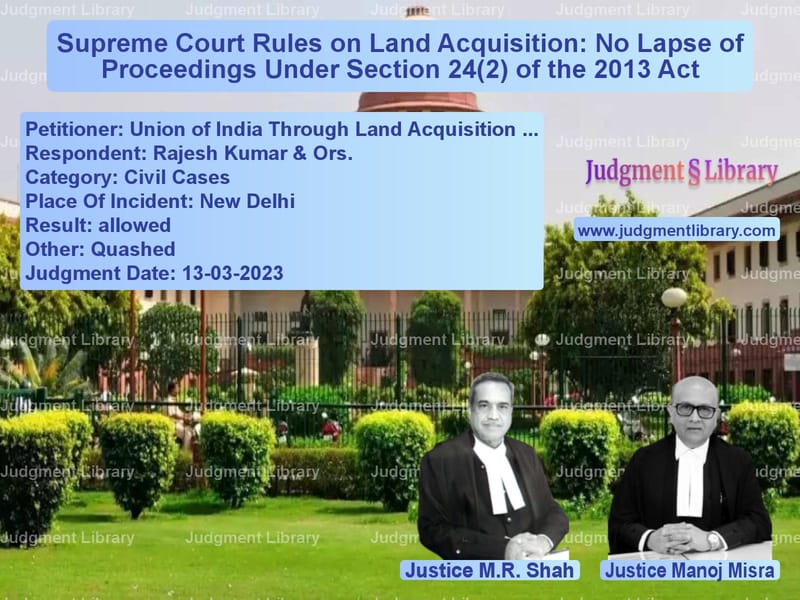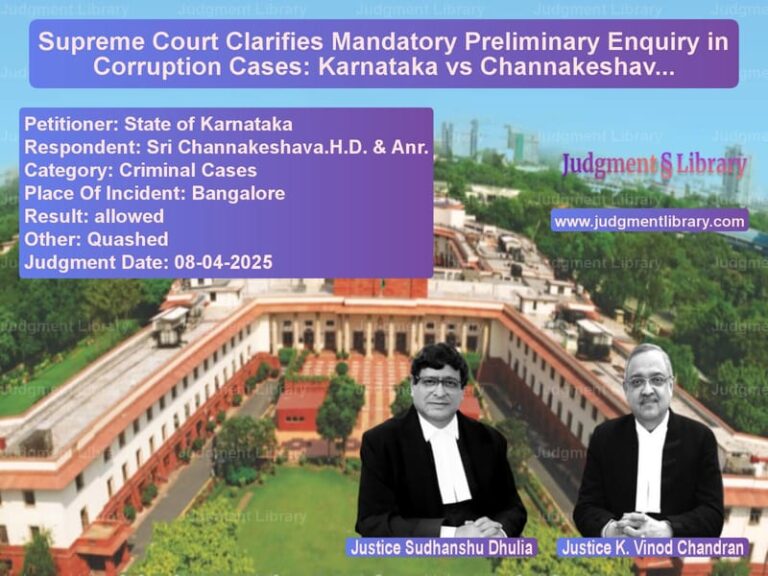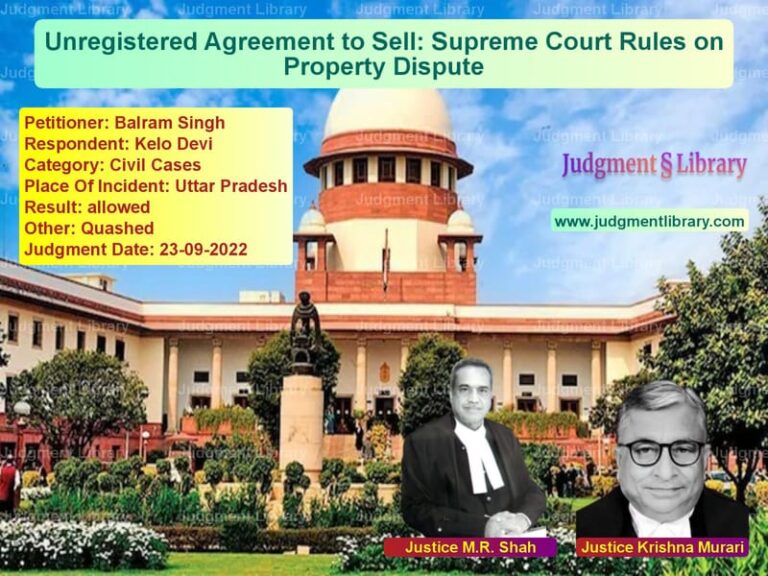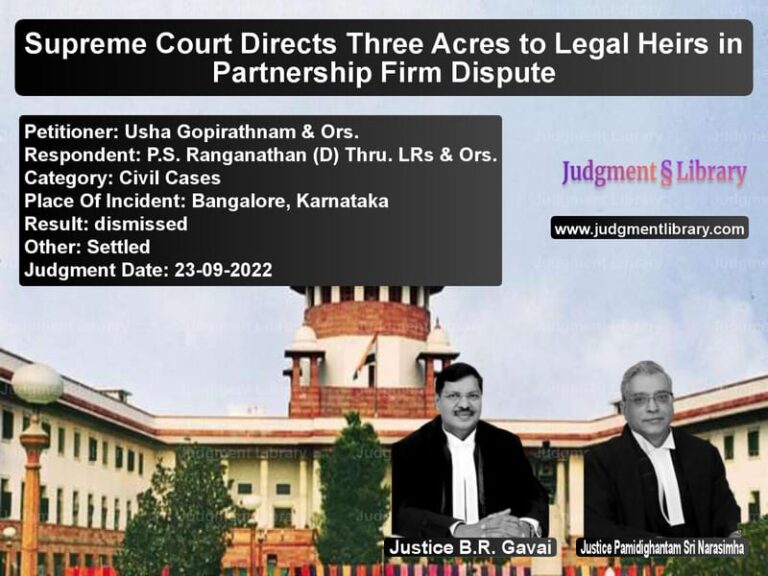Supreme Court Rules on Land Acquisition: No Lapse of Proceedings Under Section 24(2)
The case of Government of NCT of Delhi & Anr. v. Dayanand & Anr. revolves around the applicability of Section 24(2) of the Right to Fair Compensation and Transparency in Land Acquisition, Rehabilitation and Resettlement Act, 2013. The key issue before the Supreme Court was whether land acquisition proceedings could be deemed to have lapsed due to non-payment of compensation, even when possession was taken.
The Supreme Court overturned the Delhi High Court’s judgment and held that acquisition does not lapse merely because compensation was not collected by the landowner, provided possession was taken and the amount was deposited in the revenue deposit. This ruling clarifies the interpretation of Section 24(2) and its impact on pending land acquisition cases.
Background of the Case
The land in question, located in Delhi, was acquired under the Land Acquisition Act, 1894. The acquisition proceedings culminated in an award, and the government took possession of a major portion of the land. However, the landowner did not collect the compensation despite being notified.
The landowner filed a writ petition before the Delhi High Court, relying on the Supreme Court’s earlier ruling in Pune Municipal Corporation v. Harakchand Misirimal Solanki, where it was held that land acquisition would lapse if compensation was not paid to the landowner.
The High Court ruled in favor of the landowner, holding that the acquisition had lapsed under Section 24(2) of the 2013 Act. The Government of NCT of Delhi challenged this ruling before the Supreme Court.
Arguments by the Parties
Arguments by the Appellant (Government of NCT of Delhi)
- The government argued that possession of the major portion of the land (19 biswa out of 20 biswa) had been taken through possession proceedings on April 13, 2009.
- A notice under Section 12(2) of the Land Acquisition Act, 1894, was sent to the landowner on February 27, 2009, to collect compensation.
- When the landowner did not collect the amount, the compensation was deposited in the revenue deposit.
- Since possession was taken and compensation was tendered, the acquisition could not be deemed to have lapsed under Section 24(2).
- The High Court’s reliance on Pune Municipal Corporation was incorrect because that decision had been overruled by the Constitution Bench in Indore Development Authority v. Manoharlal.
Arguments by the Respondent (Dayanand & Anr.)
- The respondents argued that compensation had not been paid to them, which should result in the lapse of acquisition.
- They relied on the earlier ruling in Pune Municipal Corporation, which stated that non-payment of compensation would cause acquisition proceedings to lapse.
- The fact that a portion of the land remained in their possession should be considered proof that acquisition was incomplete.
Supreme Court’s Legal Analysis
Overruling of Pune Municipal Corporation
The Supreme Court highlighted that the decision in Pune Municipal Corporation had been explicitly overruled by the Constitution Bench in Indore Development Authority. The Constitution Bench clarified:
“The deemed lapse of land acquisition proceedings under Section 24(2) takes place only if, due to inaction of authorities for five years or more prior to the commencement of the 2013 Act, possession has not been taken nor compensation has been paid.”
The Court noted that the High Court’s reliance on Pune Municipal Corporation was incorrect because the Constitution Bench had established a different standard for lapsing of acquisition.
Effect of Compensation Being Deposited
The Court emphasized that the deposit of compensation in the revenue deposit was sufficient compliance under the law:
“Once the notice under Section 12(2) was issued and served upon the landowner and he was called upon to collect the compensation, but he failed to do so, and the amount was subsequently deposited in the revenue deposit, it would not be open for the landowner to contend that the acquisition has lapsed.”
The Court ruled that non-collection of compensation by the landowner cannot be used as an excuse to claim lapse of acquisition.
Possession and Vesting of Land
The Supreme Court reiterated the principle that once possession is taken, the land vests with the government, and the original owner loses all rights over it:
“As per the provisions of the Land Acquisition Act, 1894, once possession has been taken, the land vests with the government, and there is no divesting of the same under Section 24(2) of the 2013 Act.”
Since possession of 19 biswa was already taken in 2009, the acquisition was valid and could not be reversed.
Final Judgment by the Supreme Court
The Supreme Court ruled:
- The High Court’s judgment declaring that the acquisition had lapsed under Section 24(2) was quashed.
- The acquisition proceedings were held to be valid.
- The landowner’s writ petition before the High Court was dismissed.
- The government’s appeal was allowed.
Impact of the Judgment
- Clarifies Interpretation of Section 24(2): The ruling establishes that acquisition does not lapse merely due to non-collection of compensation.
- Prevents Misuse of the Law: The judgment ensures that landowners cannot delay compensation collection and then claim lapse of acquisition.
- Strengthens Land Acquisition Policies: It reinforces the government’s ability to proceed with acquisitions without procedural hindrances.
- Aligns with Constitution Bench Ruling: The decision follows the precedent set in Indore Development Authority, ensuring consistency in legal interpretation.
Conclusion
The Supreme Court’s ruling in Government of NCT of Delhi v. Dayanand provides clarity on the applicability of Section 24(2) of the 2013 Act. By holding that acquisition does not lapse if possession is taken and compensation is deposited, the judgment reinforces legal certainty in land acquisition matters. The ruling prevents misuse of legal provisions and ensures that government infrastructure projects are not unduly delayed due to technical objections.
Petitioner Name: Government of NCT of Delhi & Anr..Respondent Name: Dayanand & Anr..Judgment By: Justice M.R. Shah, Justice C.T. Ravikumar.Place Of Incident: Delhi.Judgment Date: 13-03-2023.
Don’t miss out on the full details! Download the complete judgment in PDF format below and gain valuable insights instantly!
Download Judgment: government-of-nct-of-vs-dayanand-&-anr.-supreme-court-of-india-judgment-dated-13-03-2023.pdf
Directly Download Judgment: Directly download this Judgment
See all petitions in Property Disputes
See all petitions in Landlord-Tenant Disputes
See all petitions in Judgment by Mukeshkumar Rasikbhai Shah
See all petitions in Judgment by C.T. Ravikumar
See all petitions in allowed
See all petitions in Quashed
See all petitions in supreme court of India judgments March 2023
See all petitions in 2023 judgments
See all posts in Civil Cases Category
See all allowed petitions in Civil Cases Category
See all Dismissed petitions in Civil Cases Category
See all partially allowed petitions in Civil Cases Category







